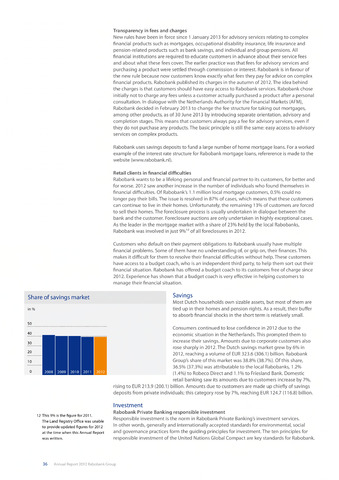Share of savings market Savings
Investment
Transparency in fees and charges
New rules have been in force since 1 January 2013 for advisory services relating to complex
financial products such as mortgages, occupational disability insurance, life insurance and
pension-related products such as bank savings, and individual and group pensions. All
financial institutions are required to educate customers in advance about their service fees
and about what these fees cover. The earlier practice was that fees for advisory services and
purchasing a product were settled through commission or interest. Rabobank is in favour of
the new rule because now customers know exactly what fees they pay for advice on complex
financial products. Rabobank published its charges in the autumn of 2012. The idea behind
the charges is that customers should have easy access to Rabobank services. Rabobank chose
initially not to charge any fees unless a customer actually purchased a product after a personal
consultation. In dialogue with the Netherlands Authority for the Financial Markets (AFM),
Rabobank decided in February 2013 to change the fee structure for taking out mortgages,
among other products, as of 30 June 2013 by introducing separate orientation, advisory and
completion stages. This means that customers always pay a fee for advisory services, even if
they do not purchase any products. The basic principle is still the same: easy access to advisory
services on complex products.
Rabobank uses savings deposits to fund a large number of home mortgage loans. For a worked
example of the interest rate structure for Rabobank mortgage loans, refererence is made to the
website (www.rabobank.nl).
Retail clients in financial difficulties
Rabobank wants to be a lifelong personal and financial partner to its customers, for better and
for worse. 2012 saw another increase in the number of individuals who found themselves in
financial difficulties. Of Rabobank's 1.1 million local mortgage customers, 0.5% could no
longer pay their bills. The issue is resolved in 87% of cases, which means that these customers
can continue to live in their homes. Unfortunately, the remaining 13% of customers are forced
to sell their homes. The foreclosure process is usually undertaken in dialogue between the
bank and the customer. Foreclosure auctions are only undertaken in highly exceptional cases.
As the leader in the mortgage market with a share of 23% held by the local Rabobanks,
Rabobank was involved in just 9%12 of all foreclosures in 2012.
Customers who default on their payment obligations to Rabobank usually have multiple
financial problems. Some of them have no understanding of, or grip on, their finances. This
makes it difficult for them to resolve their financial difficulties without help. These customers
have access to a budget coach, who is an independent third party, to help them sort out their
financial situation. Rabobank has offered a budget coach to its customers free of charge since
2012. Experience has shown that a budget coach is very effective in helping customers to
manage their financial situation.
Most Dutch households own sizable assets, but most of them are
in tied up in their homes and pension rights. As a result, their buffer
to absorb financial shocks in the short term is relatively small.
50
Consumers continued to lose confidence in 2012 due to the
economic situation in the Netherlands. This prompted them to
increase their savings. Amounts due to corporate customers also
rose sharply in 2012. The Dutch savings market grew by 6% in
2012, reaching a volume of EUR 323.6 (306.1) billion. Rabobank
Group's share of this market was 38.8% (38.7%). Of this share,
36.5% (37.3%) was attributable to the local Rabobanks, 1.2%
(1.4%) to Robeco Direct and 1.1% to Friesland Bank. Domestic
retail banking saw its amounts due to customers increase by 7%,
rising to EUR 213.9 (200.1) billion. Amounts due to customers are made up chiefly of savings
deposits from private individuals; this category rose by 7%, reaching EUR 124.7 (116.8) billion.
Rabobank Private Banking responsible investment
Responsible investment is the norm in Rabobank Private Banking's investment services.
In other words, generally and internationally accepted standards for environmental, social
and governance practices form the guiding principles for investment. The ten principles for
responsible investment of the United Nations Global Compact are key standards for Rabobank.
30
20
10
0
2008
2009
2010 2011
12 This 9% is the figure for 2011.
The Land Registry Office was unable
to provide updated figures for 2012
at the time when this Annual Report
was written.
36 Annual Report 2012 Rabobank Group

